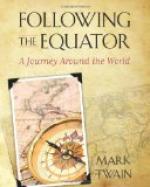He set himself this incredible task: to go out into the wilderness, the jungle, and the mountain-retreats where the hunted and implacable savages were hidden, and appear among them unarmed, speak the language of love and of kindness to them, and persuade them to forsake their homes and the wild free life that was so dear to them, and go with him and surrender to the hated Whites and live under their watch and ward, and upon their charity the rest of their lives! On its face it was the dream of a madman.
In the beginning, his moral-suasion project was sarcastically dubbed the sugar plum speculation. If the scheme was striking, and new to the world’s experience, the situation was not less so. It was this. The White population numbered 40,000 in 1831; the Black population numbered three hundred. Not 300 warriors, but 300 men, women, and children. The Whites were armed with guns, the Blacks with clubs and spears. The Whites had fought the Blacks for a quarter of a century, and had tried every thinkable way to capture, kill, or subdue them; and could not do it. If white men of any race could have done it, these would have accomplished it. But every scheme had failed, the splendid 300, the matchless 300 were unconquered, and manifestly unconquerable. They would not yield, they would listen to no terms, they would fight to the bitter end. Yet they had no poet to keep up their heart, and sing the marvel of their magnificent patriotism.
At the end of five-and-twenty years of hard fighting, the surviving 300 naked patriots were still defiant, still persistent, still efficacious with their rude weapons, and the Governor and the 40,000 knew not which way to turn, nor what to do.
Then the Bricklayer—that wonderful man—proposed to go out into the wilderness, with no weapon but his tongue, and no protection but his honest eye and his humane heart; and track those embittered savages to their lairs in the gloomy forests and among the mountain snows. Naturally, he was considered a crank. But he was not quite that. In fact, he was a good way short of that. He was building upon his long and intimate knowledge of the native character. The deriders of his project were right—from their standpoint—for they believed the natives to be mere wild beasts; and Robinson was right, from his standpoint—for he believed the natives to be human beings. The truth did really lie between the two. The event proved that Robinson’s judgment was soundest; but about once a month for four years the event came near to giving the verdict to the deriders, for about that frequently Robinson barely escaped falling under the native spears.
But history shows that he had a thinking head, and was not a mere wild sentimentalist. For instance, he wanted the war parties (called) in before he started unarmed upon his mission of peace. He wanted the best chance of success—not a half-chance. And he was very willing to have help; and so, high rewards were advertised, for any who would go unarmed with him. This opportunity was declined. Robinson persuaded some tamed natives of both sexes to go with him—a strong evidence of his persuasive powers, for those natives well knew that their destruction would be almost certain. As it turned out, they had to face death over and over again.




